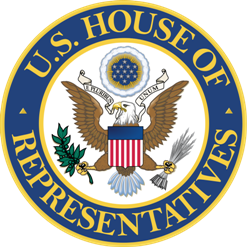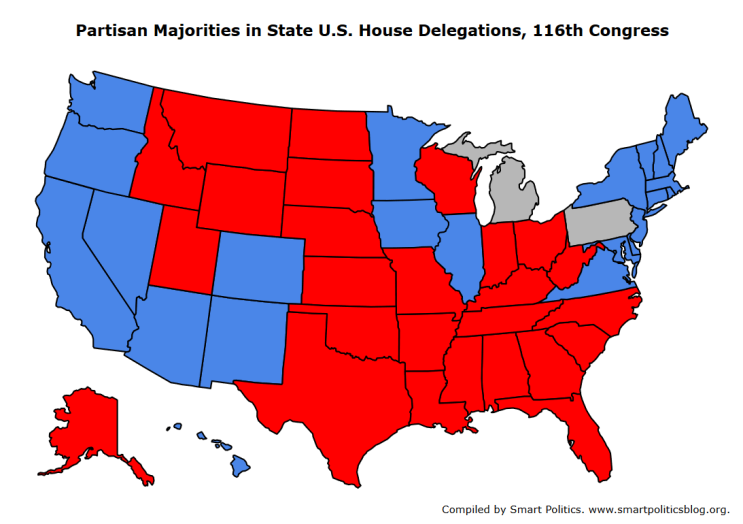What a US House Vote to Decide the 2020 Presidential Election Might Look Like
Despite Democrats controlling the nation’s lower legislative chamber by more than 35 seats, Republicans currently have a partisan advantage in 26 U.S. House state delegations

While there has been speculation that prominent third party candidates (e.g. John Kasich, Mark Cuban) might emerge next year to create an electoral map that could hypothetically deny an outright Electoral College winner, the chances of this fanciful scenario are truthfully quite remote.
It’s been a half-century since three candidates carried at least one state in a presidential election and nearly 200 years since no candidate won a majority of Electoral College votes.
If this unlikelihood becomes a reality and no candidate emerges with an electoral majority, then the presidential election will be determined by a vote in the U.S. House of Representatives. The top three candidates in the presidential race are considered and each state delegation receives one vote.
While Democrats enjoy a healthy 36-seat majority at the onset of the 116th Congress, the Republican presidential nominee is currently poised to win such a vote in the chamber by state delegation.
The GOP owns a majority of U.S. House seats in the delegations of 26 states: Alabama, Alaska, Arkansas, Florida, Georgia, Idaho, Indiana, Kansas, Kentucky, Louisiana, Mississippi, Missouri, Montana, Nebraska, North Carolina, North Dakota, Ohio, Oklahoma, South Carolina, South Dakota, Tennessee, Texas, Utah, West Virginia, Wisconsin, and Wyoming.
Democrats, meanwhile, have a majority in just 22 states: Arizona, California, Colorado, Connecticut, Delaware, Hawaii, Illinois, Iowa, Maine, Maryland, Massachusetts, Minnesota, Nevada, New Hampshire, New Jersey, New Mexico, New York, Oregon, Rhode Island, Vermont, Virginia, and Washington.
Two states are currently deadlocked – Michigan (seven each) and Pennsylvania (nine each).
Unless Democrats are able to make inroads in a few of these states in the 2020 cycle, it appears the Republican nominee would likely emerge as the victor in the event of such a contingent election in the chamber in January 2021 (the vote would be held during the first week of the 117th Congress).
While the presidential popular/Electoral College vote in a given state would generally be highly correlated to its the U.S. House delegation vote, one could easily envision a scenario in which a Democratic nominee carried a state’s popular vote but lost its delegation vote (e.g. Wisconsin). This also presumes no newly elected delegation members would (courageously) bind their vote to the popular vote of their state.
Four seats were decided by less than 10 points in Michigan in 2018 – the 6th (Fred Upton, 4.6 points) and 7th (Tim Walberg, 7.6 points) won by Republicans and the 8th (Elissa Slotkin, 3.8 points) and 11th (Haley Stevens, 6.7 points) by Democrats. Two GOP seats in Pennsylvania were won by single digits – the 10th (Scott Perry, 2.6 points) and 16th (Mike Kelly, 4.3 points) – plus the Democratic 8th CD (Matt Cartwright, 9.3 points).
Aside from the seven states with one at-large U.S. Representative (Alaska, Delaware, Montana, North Dakota, South Dakota, Vermont, and Wyoming), just three states currently find a party with only a one-seat advantage in its delegation.
Republicans hold a 14-13 seat advantage in Florida while Democrats control four of the seven seats in Colorado and five of nine in Arizona.
Three GOP districts in Florida were won by single digits in 2018: the 15th (Ross Spano, 6.0 points), the 16th (Vern Buchanan, 9.1 points), and the 18th (Brian Mast, 8.6 points). Each of the four Democratic-held seats in Colorado were carried by double-digits but two Democratic-held districts in Arizona were won by single digits: the 1st (Tom O’Halleran, 7.7 points) and 2nd (Ann Kirkpatrick, 9.5 points).
Two of the nation’s seven at large seats were decided by less than 10 points: Alaska (Don Young, 6.6 points) and Montana (Greg Gianforte, 4.6 points).
Eleven other states currently have a two-seat separation for partisan control of the delegation: Republicans have a two-seat advantage in Idaho, Kansas, Mississippi, and Utah while Democrats have the same in Hawaii, Iowa, Maine, Minnesota, Nevada, New Hampshire, and Rhode Island.
Follow Smart Politics on Twitter.


If no candidate won 270 electoral votes, would the contingent election be held in 2021 with the new Congress? IIRC the first act of the new Congress is to officially certify the Electoral College votes.
If so, in such a scenario, the Vice Presidency (which is determined independently by the Senate) is also precarious. Democrats would need to net four seats to secure their VP choice, since between January 3 and January 20, a tie would still be broken in the Republicans’ favor.
The contingent election for the 1824 presidential race was held February 9, 1825, with still a month left in the 18th Congress (1823-1825).
But you are correct that the current law requires the vote (or the first of several votes, hypothetically) during the new Congress.
AZ: Neither party has held a two-seat edge since the Rs at the close of 112th Congress; since 2013, each side has had at least 4 seats (Ds holding control in North & NE; Southwest; South Phoenix; and Southeast Suburban Maricopa) – with East Tucson & Southeast switching twice, effectively determining partisan control of delegation of Grand Canyon State.
Good catch – thank you! Will note the 5-4 split above accordingly.
2. To the best of my knowledge, Mark Cuban of “Mavs” and “Shark Tank” fame has never given any indication that he would launch a presidential bid as a non-major party contender. Indeed, the much more prominent business tycoons are either bidding for the D nomination (e.g. Tom Steyer; Michael Bloomberg, himself an ex-three-term non-Democratic mayor of NYC) or sitting out the ’20 cycle outright (e.g. Bob Iger, who is preoccupied with completing the acquisition of the Fox movie studio into the Disney entertainment empire).
3. Hopefully DCCC Chair Cheri Bustos and Co. have plans for attaining the 26+ state delegation majority, in addition to merely holding the approximately 54.3% of the chamber (wanted: a few seats in FL, MI, PA, and at least one other).